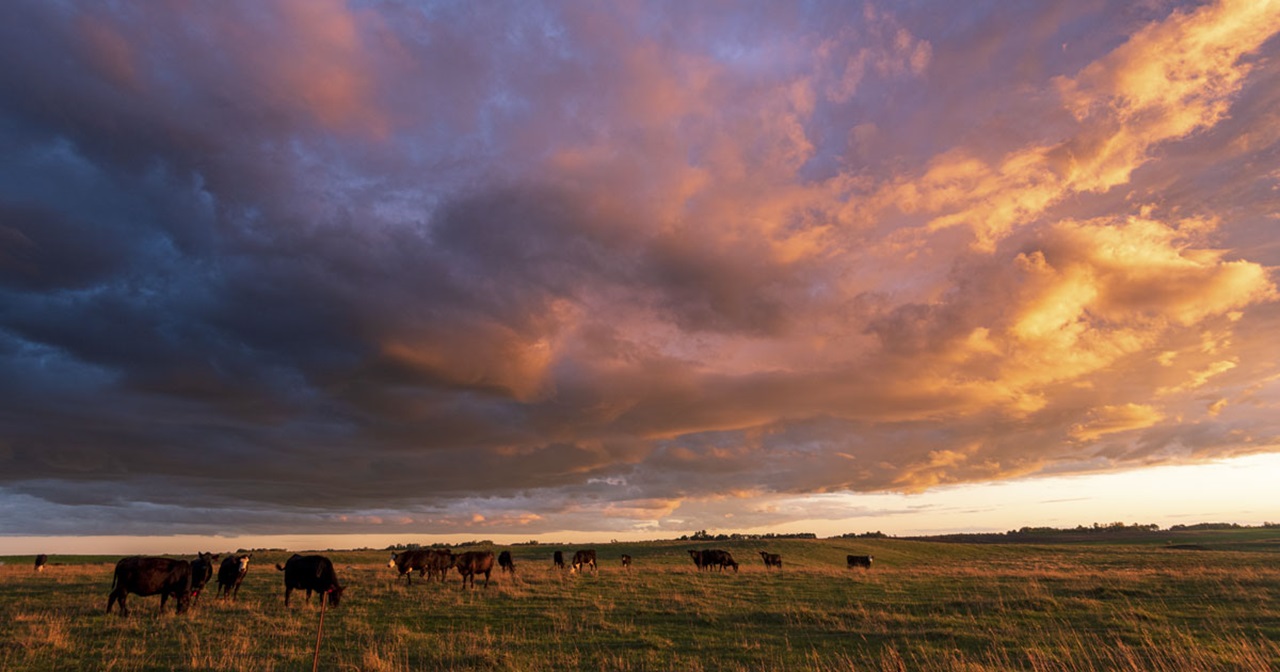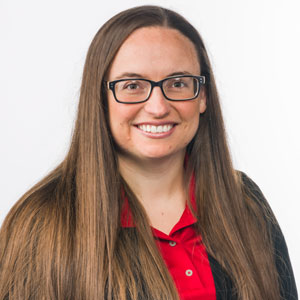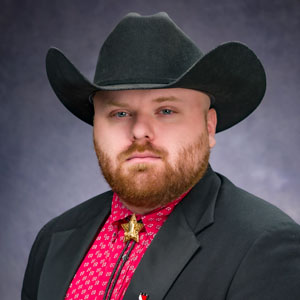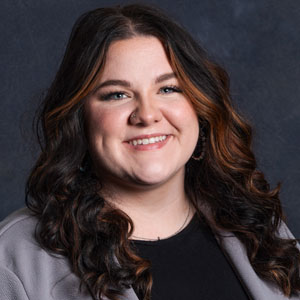Knudson School of Law Prepares Lawyers for State's Vibrant Rural Communities

However, far too many rural communities face lawyer shortages, and far too many young lawyers are unaware of the opportunities that exist in these communities.
The University of South Dakota Knudson School of Law demonstrates its commitment to partner with lawyers and rural communities through creative programs and curriculum that develop lawyers with the skills and inclination to provide the legal services that rural communities need to thrive.
As the only law school in South Dakota, the Knudson School of Law is uniquely positioned to address the legal needs and opportunities in rural communities. Located in Vermillion, South Dakota, the school of law exists in the heart of rurality. Many of its students and faculty have rural roots, including Knudson School of Law Dean Neil Fulton, J.D., who is originally from Miller, South Dakota.
“The University of South Dakota Knudson School of Law is a community of excellence, service, and leadership,” said Fulton. “Each of these core values manifests in the work of the lawyer leaders who serve rural communities in South Dakota and beyond.”
Interest in and connection to rural communities form the Knudson School of Law’s mission. From its partnerships and programming to rural-focused scholarship and alumni serving as rural lawyers, the law school is at the forefront of addressing rural legal needs.
Forging Connections
The South Dakota Law Review (SDLR) commemorated one of the law school’s partnerships in September of 2023 with its symposium marking the 10-year anniversary of South Dakota’s Project Rural Practice (PRP).
PRP is a collaborative effort between the South Dakota State Bar, South Dakota Unified Judicial System and local governments to support rural attorney placement through a loan forgiveness and mentorship support program. The program has placed nearly 30 lawyers in rural communities across South Dakota.
The SDLR symposium brought together scholars from across the country, current students, and South Dakota rural lawyers, judges and policymakers to reflect on the accomplishments of PRP and similar programs as well as the challenges that continue to shape the legal landscape of rural America.
South Dakota Supreme Court Chief Justice Steven R. Jensen, J.D. ’88, provided a keynote address to frame the history and future of rural practice.
Panel discussions allowed rural attorneys, judges and scholars to share insights about indigent defense, ethical issues facing rural lawyers, the unique issues facing rural communities in Indian Country, and how law schools and courts can develop feasible pathways to rural practice.
"The law school is an indispensable partner in attracting students to pursue a legal career in a rural community,” said alumnus Pat Goetzinger, J.D. ’88, B.S. ’82, who led the creation of PRP during his service as state bar president for South Dakota. “The law school’s annual mix of events and opportunities, in partnership with Project Rural Practice and the Unified Judicial System, to discuss and expose law students to the Rural Attorney Recruitment Program is essential to the success of restocking rural main streets with attorneys and delivering access to justice in rural communities.”
The symposium’s programming included recognizing the next generation of lawyer leaders.
Trevor Case, J.D., was recognized as the recipient of the Robert A. and Jo Anna Warder Law School Scholarship.
Robert A. Warder, a 1966 graduate of the Knudson School of Law and long-time practitioner, and his wife, Jo Anna Warder, endowed this scholarship to support students who come from and intend to return to rural communities in South Dakota.
“I was immensely grateful to have received this scholarship,” said Case, who is originally from Webster, South Dakota. “This scholarship has helped me by not only alleviating the burden of hefty loans but also impacting my financial stability throughout my academic journey. Additionally, it paved the way for a brighter future post-graduation, offering me the opportunity to start my professional life on a much firmer financial footing. This scholarship not only lightened my financial load but also illuminated the path toward becoming more generous in my community after school.”
Case, who graduated in May, recently accepted a job at Davenport, Evans, Hurwitz & Smith, LLP in Sioux Falls, South Dakota.
“I look forward to helping clients and learning more about the practice of law,” Case said. “Also, I am excited to grow as a professional and become more connected with other great people in Sioux Falls.”
The Knudson School of Law’s Office of Career Services hosted the second annual rural recruitment fair in tandem with the symposium.
The fair welcomed lawyers from many rural South Dakota communities to meet students, share information about their communities and practice, and arrange placements for summer internships and permanent jobs.
“It is imperative to create special programming to help students understand the opportunities in rural South Dakota,” said Teramie Hill, director of career services at the law school.
On-campus interviews, class visits and other events with rural practitioners expose students to opportunities in rural communities that they may not have previously been aware of.
“The Knudson School of Law’s ongoing efforts produce students who choose rural practice,” said Fulton.
Second-year law student Peyton Garbers became one of those students during the rural career fair in the fall of 2023. Although originally from South Dakota’s largest city – Sioux Falls –Garber was intrigued by 1996 Knudson School of Law graduate Thomas Sannes description of his vibrant criminal and civil litigation practice in a rural community in northeast South Dakota.
Following a conversation that Garbers initiated after that panel, he accepted an internship placement with Sannes in Webster, South Dakota, for the summer of 2024.
“I’m originally from Sioux Falls, so it certainly is a step out of my comfort zone to take this placement,” Garbers. “But it is a challenge I welcome, and I will only be better as an attorney because of it. I will get a chance to interact with the community in a way that you could not get in a larger city like Sioux Falls and build relationships with my supervising attorney’s clients.”
Rural-Focused Scholarship
The USD Knudson School of Law offers curricular opportunities that focus on rural practice.
A seminar on agricultural law provides students with exposure to crucial legal issues for lawyers who want to serve rural communities in settings ranging from solo practices to policy work in Congress.
Classes in environmental law and natural resources and water law equip students to represent rural communities seeking to preserve a clean, healthy environment. Across the curriculum, classes like Trusts and Estates, Business Associations, Externships, and Bankruptcy focus on the particular ways that rural and agricultural issues are engaged by those bodies of law.
With South Dakota having one of the highest Native populations in the U.S., USD’s law school is committed to recruiting Native students and providing opportunities for all law students to learn about the major legal principles and developments of federal Indian law.
In 2022, the Knudson School of Law introduced an Indian law certificate to prepare students to be fluent in federal Indian law. Students graduate with a strong understanding of various tribal approaches to enacting laws, the federal law framework governing tribal casinos and other gaming enterprises, and how to assist Native clients.
“The USD Knudson School of Law was my first-choice school because of its relationship with the tribes of South Dakota,” said recent graduate Abigail Ruda, J.D. “The Indian law program affords me the opportunity to engage with the law on professional, practical and personal levels. Our state thrives when all our people do, and the Indian law program benefits South Dakota by giving emerging attorneys the knowledge necessary to do good work in Indian Country.”
A unique requirement of the Indian law certificate is participation in the Tribal Wills Practicum, in which students assist South Dakota’s Native citizens with estate planning.
Participating students travel to Indian Country over spring break to meet with clients, outline options and issues, and complete estate plans under the supervision of Professor Tom Simmons, J.D., and adjunct professors.
USD’s commitment to rural legal issues is also reflected in faculty scholarship.
Professor Hannah Haksgaard, J.D., has written several articles about the delivery of rural legal services, and she has a forthcoming book with Cambridge University Press titled “The Rural Lawyer: How to Incentivize Rural Law Practice and Help Small Communities Thrive.”
In the book, Haksgaard evaluates the first 10 years of the Rural Attorney Recruitment Program in South Dakota and provides insight into how other rural states can replicate that success.
“The first 10 years of the Rural Attorney Recruitment Program has been very successful, with 75% of the attorneys staying in rural South Dakota to practice law,” said Haksgaard, who is originally from Yankton, South Dakota. “The last 10 years have been a learning experience for everyone involved because South Dakota was the first state to try this. The program organizers and administrators have done really good jobs managing an entirely new program.”
Haksgaard has also brought other scholars together on rural legal issues through events like the Law and Rurality Workshop conducted virtually in partnership with the University of Nebraska College of Law in November.
“Encouraging these types of conversations is important because we can learn from experts and can bring home ideas to better improve the law in rural communities,” Haksgaard said.
“The University of South Dakota Knudson School of Law is a law school of and for rural communities and their citizens,” said Fulton. “Engaging with and serving rural communities in South Dakota and beyond is central to our past, present and future as a community of excellence, service, and leadership.”
Alumni Serve Rural Communities
Dylan Kirchmeier
Originally from Webster, South Dakota, Dylan Kirchmeier, J.D. ’20, B.S. ’17, always intended on working for a rural community in his home state.
Kirchmeier now serves as the state’s attorney for Roberts County, a geographically large county in northern South Dakota with a population of a little more than 10,000 people.
“I see the full gamut of criminal cases. It’s not like in a bigger county where a particular attorney is assigned to a particular type or level of case because I see everything,” Kirchmeier explained. “I remember there was one morning where I was in court for initial appearances and I had two defendants back-to-back; one was making an initial appearance on a fishing violation for being caught with more than his limit, and the next defendant was making an initial appearance in a homicide case."
Kirchmeier was able to pursue a career in rural law because of PRP. He is currently in his fourth year of contract.
“Once the program was passed by the legislature and Gov. Kristi Noem, I knew it would be easier to be financially feasible for me to return to a rural community to practice,” said Kirchmeier.
As a state’s attorney in a rural area, Kirchmeier is most proud of his role in “delivering a just outcome for victims of crimes.”
“Being able to show them that someone is recognizing what they’ve gone through and helping them reach some sort of closure is something I’m proud of,” he said. “Obviously, it’s never going to change what happened to them, but I have the ability to at least do something to bring justice and help them move forward.”
Shantay Werdel
Another graduate committed to serving rural communities in South Dakota is Shantay Werdel, J.D.
Werdel graduated from the USD Knudson School of Law this May and now plans to return to her hometown of Highmore, South Dakota, and put her law degree to work to serve her community.
“I have a passion to serve my rural community in any way I can,” said Werdel. “Having grown up in a rural area, I have had the amazing opportunity to be a part of a community that feels like family. I could not have imagined a better way to be a part of an ever growing and changing area than by using my education to serve my rural community.”
Werdel plans to work with a local solo practitioner in Highmore, as well as with the state’s attorney in rural counties across the state.
“I am most looking forward to being able to give back to a community that has given me so much. There is also a great need for attorneys in rural South Dakota, so I am looking forward to being a part of the solution.”
Werdel chose to pursue her law degree at the USD Knudson School of Law because she wanted “to be able to learn the law from people who have practiced it in South Dakota.”
“The USD Knudson School of Law prepared me to serve as an attorney in a rural area by connecting me with several attorneys who do that very thing,” Werdel continued. “While law school is excellent at teaching the law and how to think like a lawyer, it really is the outside-of-the-classroom guidance provided by the school that has prepared me for my future as a rural attorney.”






